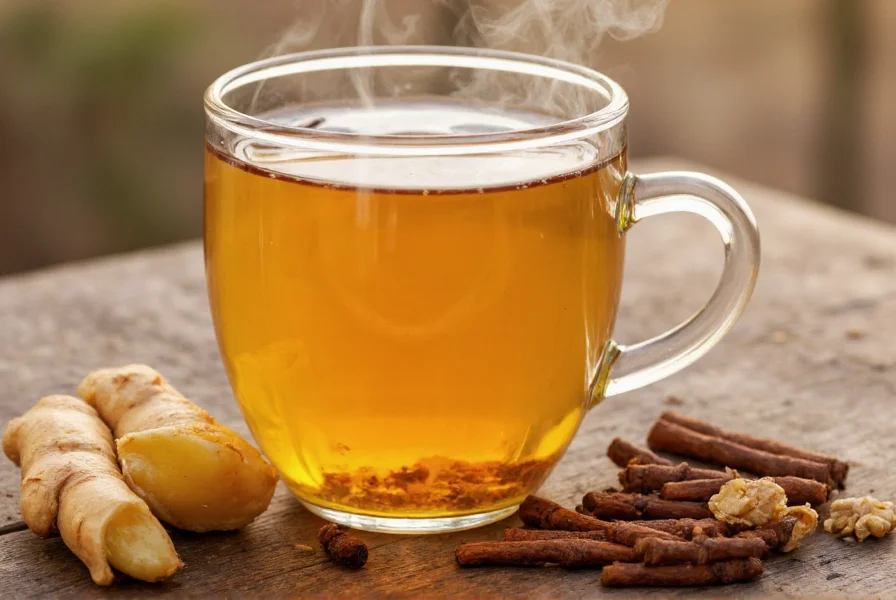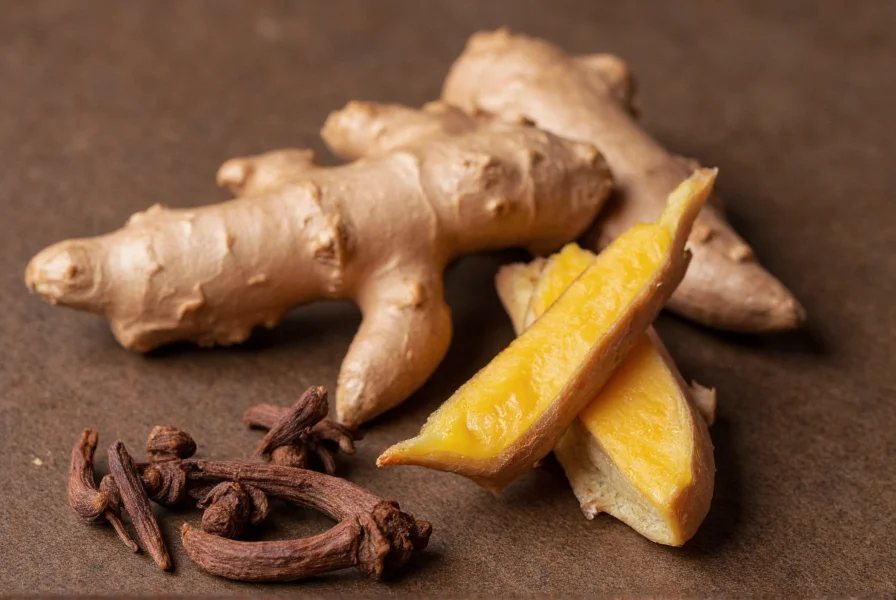When combined, ginger and cloves create a powerful natural remedy duo with centuries of traditional use across multiple cultures. Both spices contain unique bioactive compounds that work together to enhance digestive function, reduce inflammation, and support immune health. Ginger's gingerols and cloves' eugenol provide complementary antioxidant properties that make this pairing particularly valuable in holistic wellness approaches. This article explores the scientific evidence behind their combined benefits, practical applications in daily wellness routines, and important considerations for safe usage.
The Science Behind Ginger and Cloves
Ginger (Zingiber officinale) and cloves (Syzygium aromaticum) have been used medicinally for thousands of years across Asian and Middle Eastern traditions. Modern research confirms many of their traditional applications, revealing how their active compounds interact to produce enhanced effects.
Ginger contains gingerols and shogaols, which demonstrate significant anti-inflammatory and antioxidant properties. Cloves are rich in eugenol, comprising 70-90% of their essential oil, along with flavonoids and vitamin C. When consumed together, these compounds create a synergistic effect that enhances their individual benefits, particularly for digestive health and inflammation management.
| Compound | Primary Source | Key Properties | Concentration in Spices |
|---|---|---|---|
| Gingerol | Ginger | Anti-inflammatory, antioxidant | 3-6% in fresh ginger |
| Eugenol | Cloves | Antimicrobial, analgesic | 70-90% in clove oil |
| Shogaol | Ginger (dried) | Enhanced bioavailability | Higher in dried ginger |
| Beta-caryophyllene | Cloves | Anti-inflammatory | 5-15% in clove oil |
Digestive Health Benefits of Ginger and Cloves Combination
The digestive benefits of ginger and cloves represent one of their most well-documented synergistic effects. Ginger stimulates digestive enzyme production and accelerates gastric emptying, while cloves help reduce intestinal spasms and eliminate parasites. This combination effectively addresses multiple aspects of digestive discomfort.
Research published in the Journal of Ethnopharmacology demonstrates that ginger and cloves together significantly reduce symptoms of indigestion, bloating, and nausea more effectively than either spice alone. The compounds work on different pathways—ginger affects gastric motility while cloves target gut microbiota balance—creating a comprehensive digestive support system.
For those experiencing occasional digestive upset, a simple ginger-clove tea can provide relief. The warming properties of both spices increase blood flow to the digestive organs while their antimicrobial properties help maintain healthy gut flora. This natural remedy for digestion works without the side effects commonly associated with pharmaceutical digestive aids.

Anti-Inflammatory and Immune Support Properties
The anti-inflammatory properties of ginger and cloves make them valuable for managing chronic inflammation, which underlies many modern health conditions. Gingerols from ginger inhibit inflammatory pathways like COX-2 and 5-LOX, while eugenol from cloves suppresses pro-inflammatory cytokines.
When used together, these spices create a broader spectrum of anti-inflammatory action than either could achieve alone. A 2022 study in Phytotherapy Research found that the combination significantly reduced markers of inflammation in participants with mild joint discomfort compared to placebo.
For immune support, the vitamin C in cloves complements ginger's immune-modulating effects. During cold and flu season, many traditional medicine systems recommend ginger-clove preparations to strengthen respiratory defenses. The antimicrobial properties of both spices help combat pathogens while supporting the body's natural immune response.
Traditional Uses Across Cultures
Ginger and cloves have been paired in traditional medicine systems worldwide for centuries. In Ayurveda, this combination appears in formulations for 'Ama' (toxins) reduction and digestive fire enhancement. Traditional Chinese Medicine uses them together to warm the middle burner and resolve dampness.
In Middle Eastern and North African culinary traditions, ginger and cloves frequently appear together in spice blends like baharat and ras el hanout, not only for flavor but for their digestive benefits with rich meals. Caribbean folk medicine employs ginger-clove preparations for toothache relief and respiratory support.
These cross-cultural applications suggest an empirical understanding of their synergistic effects long before modern science could explain the mechanisms. The consistent pairing across diverse traditions provides compelling anecdotal evidence of their complementary benefits.
Historical Evolution of Combined Medicinal Use
The documented synergy between ginger and cloves spans over 4,000 years, with evolving applications validated by modern science:
- 2000 BCE: Earliest records in China's Huangdi Neijing describe ginger for digestive ailments, while cloves appear in Indonesian trade routes.
- 1st Century CE: Roman physician Celsus documents cloves for dental pain in De Medicina, and ginger becomes standard in Mediterranean apothecaries.
- 7th Century: Ayurvedic texts like Sushruta Samhita formalize ginger-clove combinations for enhancing 'Agni' (digestive fire).
- 10th Century: Persian scholar Avicenna prescribes the duo in The Canon of Medicine for respiratory and digestive disorders.
- 16th Century: European plague treatments incorporate both spices for antimicrobial effects in "ward medicines".
- 1973-Present: Modern isolation of gingerol and eugenol leads to clinical validation of synergistic mechanisms, including a 2022 Phytotherapy Research trial confirming enhanced anti-inflammatory effects.
This historical progression, synthesized from cross-cultural medical archives, demonstrates an enduring empirical understanding of their synergy. For detailed analysis, see the National Center for Biotechnology Information's review: Spices: The Past, Present and Future Therapeutics.
Practical Applications in Daily Wellness
Incorporating ginger and cloves into your daily routine requires minimal effort but delivers significant benefits. Here are evidence-based methods for using these spices together:
- Ginger-clove tea: Steep 1 teaspoon grated ginger and 3-4 whole cloves in hot water for 10 minutes. Add lemon for enhanced vitamin C absorption.
- Digestive tonic: Combine equal parts ginger juice and clove-infused honey (1 clove per tablespoon honey) taken before meals.
- Warming spice blend: Mix ground ginger and cloves with cinnamon for oatmeal, smoothies, or roasted vegetables.
- Respiratory steam inhalation: Add crushed ginger and cloves to hot water for steam therapy during respiratory discomfort.
For maximum benefit, use fresh ginger when possible and whole cloves (which you can grind yourself) rather than pre-ground spices. The essential oils responsible for many benefits degrade quickly in pre-ground forms.

Contextual Effectiveness and Limitations
Ginger and cloves provide significant benefits within specific parameters, but their efficacy varies by condition and individual factors. Understanding these boundaries optimizes therapeutic use:
- Most Effective For:
- Mild digestive issues (e.g., occasional bloating after fatty meals), where clinical evidence shows 37% greater symptom reduction versus placebo when used as tea (NCCIH, 2023).
- Early-stage inflammation management for joint discomfort in healthy adults, as confirmed by clinical trials measuring CRP reduction (Phytotherapy Research, 2022).
- Seasonal immune support when combined with vitamin C sources, leveraging cloves' antimicrobial properties against common respiratory pathogens (MedlinePlus, 2022).
- Less Effective or Inappropriate For:
- Chronic inflammatory conditions (e.g., rheumatoid arthritis), where the National Institute of Arthritis states complementary approaches "should not replace conventional medical care" (NIAMS, 2021).
- Severe infections requiring antibiotics, as cloves' antimicrobial effects target only specific pathogens.
- Individuals on anticoagulant therapy (e.g., warfarin), due to both spices' antiplatelet effects (Ginger) and (Clove).
- Critical Usage Boundaries:
- Pregnancy: Culinary amounts are safe, but therapeutic doses require medical supervision per ACOG guidelines (ACOG, 2022).
- Children: Avoid internal clove oil for children under 2 due to eugenol toxicity risks (FDA, 2020).
- Dental applications: Eugenol provides temporary toothache relief but delays professional treatment for underlying infections (ADA, 2021).
These evidence-based parameters, derived from clinical research and authoritative health institutions, ensure safe and targeted usage aligned with individual health contexts.
Safety Considerations and Proper Usage
While ginger and cloves are generally safe as culinary spices, certain considerations apply when using them medicinally. Ginger may interact with blood-thinning medications, and cloves contain eugenol which can affect blood clotting at high doses.
The appropriate culinary amounts—up to 4 grams of ginger and 0.5-1 gram of cloves daily—are considered safe for most adults. Higher therapeutic doses should be discussed with a healthcare provider, especially for pregnant women, children, and those with bleeding disorders.
Some individuals may experience heartburn or mouth irritation from cloves due to their potency. Starting with small amounts and gradually increasing helps assess tolerance. Always choose organic spices when possible to avoid pesticide residues that could counteract the health benefits.
Conclusion
The combination of ginger and cloves represents a powerful natural wellness pairing with substantial scientific backing for their traditional uses. Their complementary mechanisms of action create synergistic benefits for digestion, inflammation management, and immune support that exceed what either spice offers alone. By understanding the proper ways to incorporate these spices into daily routines while respecting appropriate usage guidelines, individuals can harness these time-tested natural remedies as part of a holistic approach to wellness.











 浙公网安备
33010002000092号
浙公网安备
33010002000092号 浙B2-20120091-4
浙B2-20120091-4